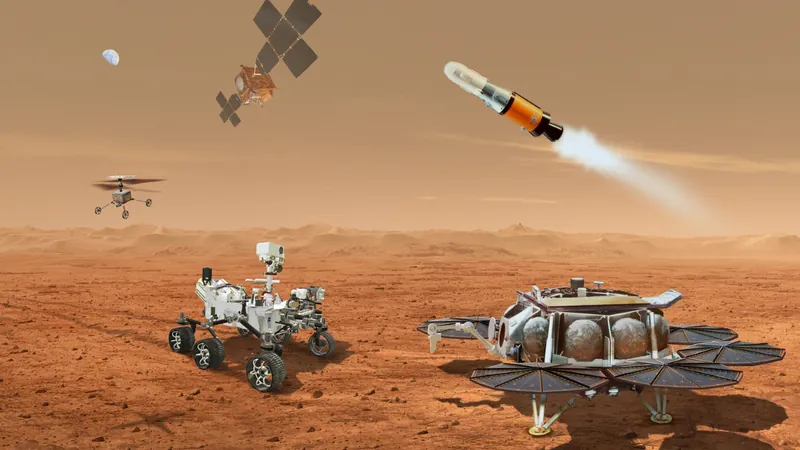
Trump's Budget Bombshell: NASA's Ambitious Mars Sample Return Mission in Jeopardy!
2025-05-14
Author: Jacques
A Potential NASA Game Changer Faces Uncertain Future
In a stunning turn of events, the Trump administration's latest budget proposal has left NASA reeling, threatening the cancellation of groundbreaking missions including the much-anticipated Mars Sample Return. Critics have branded the mission as "low priority" and "unaffordable," citing a staggering budget overrun.
A Shock to NASA's Wallet
The proposed budget for fiscal year 2026 aims to slash NASA's science funding by a jaw-dropping 47%. This could mean a drastic overall budget cut from $24.9 billion in 2025 to just $18.8 billion next year, jeopardizing vital scientific exploration.
Chasing Lunar Dreams First
According to the budget blueprint, the focus is shifting towards lunar endeavors, with a strong emphasis on returning astronauts to the Moon before China gets there. The Mars Sample Return mission intends to bring back rock samples collected by the Perseverance rover, which has been tirelessly searching for evidence of life on the Martian surface since 2021.
China's Race Against Time
This budgetary pressure is compounded by China's aggressive plans to launch its own Tianwen-3 mission, aiming to retrieve Martian rocks by 2031. The U.S. mission now faces a delayed launch timeframe of the 2030s, pushing it further back in the space race.
Staggering Costs Raise Eyebrows
An alarming estimate has pegged the cost of NASA's Mars Sample Return mission at a staggering $11 billion, with a return timeline set for 2040. Former NASA administrator Bill Nelson has expressed concerns, stating that "an $11 billion budget is too expensive, and a 2040 return date is too far away." This has intensified scrutiny over the mission's viability.
Hope on the Horizon from SpaceX?
Amidst this uncertainty, the U.S. government sees a possible alternative: prioritizing human missions over sample return. SpaceX's Elon Musk plans to launch the Starship rocket with Tesla's Optimus robot by late 2026, with hopes for crewed missions to follow by 2028.
Musk's Bold Vision for Mars
Musk has dismissed lunar colonization as a "distraction," setting his sights firmly on Mars. Meanwhile, Trump’s nominee for NASA administrator, Jared Isaacman, emphasized during a recent Senate hearing that he would prioritize Martian exploration while ensuring the U.S. reclaims its lead over China in space.
The Future of Space Exploration Hangs in the Balance
As these developments unfold, the fate of NASA's Mars Sample Return mission and America's determined aspirations in the cosmos hangs precariously in the balance, with powerful implications for the future of interplanetary exploration.









 Brasil (PT)
Brasil (PT)
 Canada (EN)
Canada (EN)
 Chile (ES)
Chile (ES)
 Česko (CS)
Česko (CS)
 대한민국 (KO)
대한민국 (KO)
 España (ES)
España (ES)
 France (FR)
France (FR)
 Hong Kong (EN)
Hong Kong (EN)
 Italia (IT)
Italia (IT)
 日本 (JA)
日本 (JA)
 Magyarország (HU)
Magyarország (HU)
 Norge (NO)
Norge (NO)
 Polska (PL)
Polska (PL)
 Schweiz (DE)
Schweiz (DE)
 Singapore (EN)
Singapore (EN)
 Sverige (SV)
Sverige (SV)
 Suomi (FI)
Suomi (FI)
 Türkiye (TR)
Türkiye (TR)
 الإمارات العربية المتحدة (AR)
الإمارات العربية المتحدة (AR)